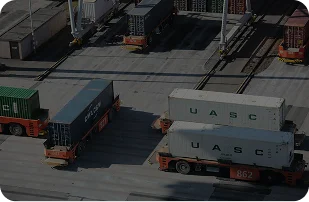Best Order Fulfillment Companies of 2025

Every month, you’re shipping more orders, but fulfillment costs keep climbing. Your team spends countless hours on order processing instead of growing your business. Peak season approaches, and you’re already dreading the inventory chaos that nearly derailed last year’s sales.
The rapid growth of ecommerce fulfillment demands has left many small businesses struggling to keep pace with customer expectations while maintaining healthy profit margins. The solution isn’t working harder but partnering with the right order fulfillment company that understands your specific requirements.
This guide examines the best order fulfillment companies for 2025, giving you the insights needed to make an informed decision that transforms your logistics from a cost center into a competitive advantage.
Best Order Fulfillment Companies: Complete Comparison for 2025
Understanding your options starts with comparing the leading fulfillment service providers. Each company serves different market segments, and the “best” choice depends on your business needs, order volume, and growth trajectory.
| Company | Best For | Minimum Orders | Accuracy Rate | Geographic Coverage | Key Advantage |
| Innovative Warehouse Solutions | Transparent, customer-focused service | 300/month | 99.98% | Strategic East Coast location | No hidden fees, direct communication |
| Red Stag Fulfillment | Heavy/fragile items | 200/month | 99.9%+ | 2 US locations | Specialized handling |
| ShipBob | Multi-channel brands | $275/month minimum | 99.95% | 60+ global locations | International presence |
| eFulfillment Service | Small startups | No minimum | 99.9% | Traverse City location | Flexible solutions |
| Fulfillment by Amazon | Amazon sellers | No minimum | 99.25% | 175+ US centers | Prime eligibility |
| ShipMonk | Subscription boxes | $250/month minimum | 99.9% | 8 US locations | Subscription expertise |
The most important insight: Many small businesses struggle with scalability because they choose fulfillment providers based on initial cost rather than long-term compatibility. The right partner often delivers lower total costs when you factor in accuracy rates, shipping costs, and customer satisfaction.
Top 6 Order Fulfillment Companies: Detailed Reviews
Innovative Warehouse Solutions – Best for Transparent, Customer-Focused Service
We specialize in helping small to mid-sized businesses ($1M+ revenue) with 300+ monthly orders achieve predictable fulfillment costs without surprise fees. Our 99.98% order accuracy rate reflects our commitment to getting every customer order right the first time.
Based on the East Coast, we serve businesses in health and beauty, lightweight consumer goods, and beverages. What sets us apart is real-time customer support—when you call, you speak directly with fulfillment experts who know your business intimately.
Our transparent pricing means you always know exactly what you’re paying. No hidden fees, no seasonal surcharges, no billing surprises. We integrate with major sales channels including Shopify fulfillment network, Amazon, and custom online store platforms.
For businesses tired of impersonal service from large fulfillment networks, we provide the personalized attention that growing companies need to scale successfully.
Red Stag Fulfillment – Best for Heavy and High-Value Products
Red Stag is highly selective about partnerships, focusing exclusively on businesses shipping products over 5 pounds or valued above $100. Their 99.9%+ accuracy rate comes with a 100% money-back guarantee on processing errors.
Operating from Tennessee and Utah, they reach 96% of the US population within two days using ground shipping. This makes them ideal for furniture, appliances, and luxury goods requiring specialized handling.
ShipBob – Best for Multi-Channel Brands
ShipBob’s global fulfillment network spans 60+ warehouse locations across North America, Europe, and Australia. Their comprehensive services include ecommerce fulfillment, retail distribution, and marketplace integration through a unified platform.
With a $275 monthly minimum and 99.95% accuracy rate, they target growing businesses needing sophisticated logistics without managing multiple vendor relationships. Their analytics dashboard provides inventory tracking, demand forecasting, and performance metrics.
eFulfillment Service – Best for Small Startups
Operating since 2001 from Traverse City, Michigan, eFulfillment Service serves customers that larger providers often overlook: small businesses with limited order volume and tight budgets.
Their no minimum requirement and month-to-month contracts make them accessible to businesses shipping as few as 10 orders monthly. Every client receives direct access to their fulfillment team for custom solutions and rapid problem resolution.
Fulfillment by Amazon (FBA) – Best for Amazon-Focused Sellers
FBA leverages the world’s largest fulfillment network to provide unmatched delivery speed and customer reach. With 175+ fulfillment centers, FBA provides automatic Prime eligibility, significantly increasing conversion rates.
However, storage fees range from $0.78-$2.40 per cubic foot monthly for standard items, with additional peak season charges. Seller fulfilled prime requires maintaining strict performance metrics without FBA’s infrastructure benefits.
ShipMonk – Best for Subscription and Crowdfunding Businesses
ShipMonk’s eight US locations and specialized technology cater to subscription box businesses and crowdfunding campaigns. They excel at handling recurring shipments, custom packaging, and campaign-based fulfillment.
Their platform integrates with major subscription management systems and provides analytics for subscription-specific metrics. The expertise in recurring order patterns justifies their premium pricing for subscription businesses.
How to Choose the Right Partner for Your Business
Selecting the best fulfillment services requires moving beyond comparing basic pricing to understand total business impact.
Start with Your Order Volume and Growth Projections
Your current monthly orders determine which fulfillment providers will consider your business, but growth projections determine scalability. Calculate your expected volume for the next 12-24 months, including seasonal variations from peak shopping periods.
Consider Product Characteristics and Special Requirements
Not all fulfillment centers handle all products equally. Weight, dimensions, and special handling requirements significantly impact costs and provider options. Temperature controlled storage, custom packaging, and fragile item handling require specialized capabilities.
Evaluate Geographic Coverage Strategy
Your customers’ locations should drive fulfillment center selection. Multiple warehouse locations reduce shipping costs and improve fast delivery times, but single-location providers often offer better customer experience through personalized service.
Review Technology Integration Capabilities

Your fulfillment partner must integrate seamlessly with your existing ecommerce platform, inventory management system, and customer service tools. Poor integration creates manual processes and customer experience problems.
Understand True Pricing Structure
Look beyond advertised rates to understand every potential fee. Many providers advertise low base rates but generate revenue through hidden fees, seasonal surcharges, or required minimums not clearly disclosed initially.
Common Challenges to Avoid
The biggest mistake is choosing based solely on monthly fees without considering service quality. Poor order fulfillment process management costs more in lost customer loyalty than you save on lower rates. Long term contracts can lock you into relationships that don’t scale with business growth.
Frequently Asked Questions
What factors most impact fulfillment costs for small businesses?
Fulfillment costs vary significantly based on product characteristics, shipping destinations, order volume consistency, and service requirements. Focus on total cost of ownership rather than base rates when comparing providers.
How long does transitioning to new fulfillment providers typically take?
Most transitions require several weeks to months depending on inventory volume, system complexity, and integration requirements. Planning adequate time for thorough testing helps avoid operational disruptions.
Do I need separate providers for domestic and international orders?
Not necessarily. Many fulfillment providers offer international shipping services, though costs and capabilities vary. Some businesses use domestic providers for local orders and specialized international fulfillment companies for global reach.
How can I maintain my brand standards with fulfillment partners?
Choose providers offering custom packaging options and understanding brand presentation importance. Include specific packaging requirements in your service agreement. Providers focused on personalized service typically accommodate specific brand requirements better.



